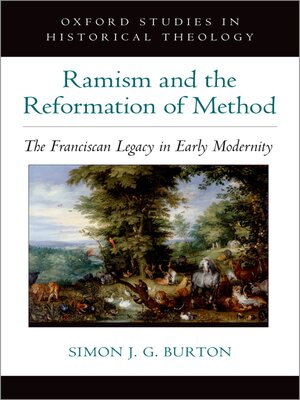Ramism and the Reformation of Method
ebook ∣ The Franciscan Legacy in Early Modernity · Oxford Studies in Historical Theology
By Simon J. G. Burton

Sign up to save your library
With an OverDrive account, you can save your favorite libraries for at-a-glance information about availability. Find out more about OverDrive accounts.
Find this title in Libby, the library reading app by OverDrive.



Search for a digital library with this title
Title found at these libraries:
| Library Name | Distance |
|---|---|
| Loading... |
Ramism and the Reformation of Method offers a fresh exploration of the philosophical and theological presuppositions of the early modern movement of Ramism. It shows how Ramism was grounded in medieval Augustinian and Franciscan thought and charts its reception within the wider movement of Reformed scholasticism. It thereby challenges a widespread narrative associating Reformed Protestantism with disenchantment and the onset of secularism. Tracing a broad arc from Ramus to Comenius, it examines the nature and formation of Ramism and its subsequent development and transformation, revealing that Ramism was at the epicentre of a methodological revolution which came to profoundly impact every sphere of early modern thought. For its devotees, Ramism became the hallmark of a truly Christian philosophy and theology, the divine pattern of all reality, and the key to restoring a unified Christendom. Fundamental to Ramism was a dynamic convergence of ontology, epistemology, and theology resonating with Franciscan reform. In particular, Ramism was profoundly indebted to an eclectic Neo-Platonist and Scotist approach to reality and developed as a supernatural logic of faith patterned on Scripture. It was also expressed according to a wider mathematization and systematization of knowledge grounded in Cusan and Fabrist ideals. Ramism and the Reformation of Method exposes the deep roots of the early modern encyclopaedia in medieval and Renaissance thought and shows how Ramism was realized in an important Edenic paradigm, issuing in a Trinitarian and eschatological drive for the universal reform of Church and society.







